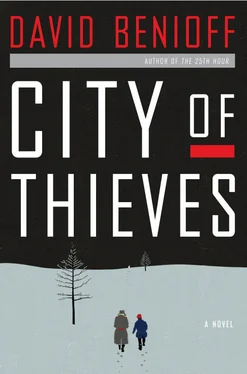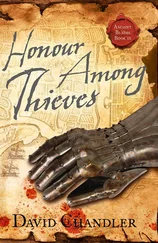Oleg found the dead man’s wallet and grinned as he counted out the deutsche marks. Vera pocketed a chronometer, twice as big as a wristwatch, that the German had worn around the sleeve of his flight jacket. Grisha found a pair of folded binoculars in a leather case, two extra magazines for the Walther, and a slim hip flask. He unscrewed the cap, sniffed, and passed me the flask.
“Cognac?”
I took a sip and nodded. “Cognac.”
“When did you ever taste cognac?” asked Vera.
“I’ve had it before.”
“When?”
“Let me see,” said Oleg, and the bottle went around the circle, the four of us squatting on our haunches around the fallen pilot, sipping the liquor that might have been cognac or brandy or Armagnac. None of us knew the difference. Whatever it was, the stuff was warmth in the belly.
Vera stared at the German’s face. Her expression held no pity, no fear, only curiosity and contempt—the invader had come to drop his bombs on our city and instead had dropped himself. We hadn’t shot him down, but we felt triumphant anyway. No one else in the Kirov had come across an enemy’s corpse. We would be the talk of the apartment bloc in the morning.
“How do you think he died?” she asked. No bullet wounds blemished the body, no singed hair or leather, no sign of any violence at all. His skin was far too white for the living, but nothing had pierced it.
“He froze to death,” I told them. I said it with authority because I knew it was true and I had no way to prove it. The pilot had bailed out thousands of feet above nighttime Leningrad. The air at ground level was too cold for the clothes he was wearing—up in the clouds, outside of his warm cockpit, he never had a chance.
Grisha raised the flask in salute. “Here’s to the cold.”
The flask began to circle again. It never got to me. We should have heard the car’s engine from two blocks away, the city after curfew was quiet as the moon, but we were busy drinking our German liquor, making our toasts. Only when the GAZ turned onto Voinova Street, heavy tires rattling on the asphalt, headlights stabbing toward us, did we realize the danger. The punishment for violating curfew without a permit was summary execution. The punishment for abandoning a firefighting detail was summary execution. The punishment for looting was summary execution. The courts no longer operated; the police officers were on the front lines, the prisons half full and dwindling fast. Who had food for an enemy of the state? If you broke the law and you were caught, you were dead. There wasn’t time for any legal niceties.
So we ran. We knew the Kirov better than anyone. Once we got inside the courtyard gates and into the chilled darkness of the sprawling building, no one could find us if they had three months to search. We could hear the soldiers shouting at us to stop, but that didn’t matter; voices didn’t frighten us, only bullets made a difference and no one had pulled a trigger yet. Grisha made it to the gate first—he was the closest thing to an athlete among us—he leaped onto the iron bars and hoisted himself upward. Oleg was right behind him and I was behind Oleg. Our bodies were weak, muscles shrunken from lack of protein, but fear helped us scale the gate as quickly as we ever had.
Near the top of the gate I looked back and saw that Vera had slipped on a patch of ice. She stared up at me, her eyes round and fearful, on her hands and knees as the GAZ braked beside the body of the German pilot and four soldiers stepped out. They were twenty feet away, their rifles in their hands, but I still had time to pull myself over the gate and disappear into the Kirov.
I wish I could tell you that the thought of deserting Vera never entered my mind, that my friend was in danger and I went to her rescue without hesitation. Truly, though, at that moment I hated her. I hated her for being clumsy at the worst possible time, for staring up at me with her panicked brown eyes, electing me to be her savior even though Grisha was the only one she had ever kissed. I knew that I could not live with the memory of those eyes pleading for me, and she knew it, too, and I hated her even as I jumped down from the gate, lifted her to her feet, and hauled her to the iron bars. I was weak, but Vera couldn’t have weighed forty kilos. I boosted her onto the gate as the soldiers shouted and their boot heels slapped on the pavement and the bolts of their rifles snapped into place.
Vera went over the top and I scrambled up behind her, ignoring the soldiers. If I stopped, they would gather around me, tell me I was an enemy of the state, force me to kneel, and shoot me in the back of the head. I was an easy target now, but maybe they were drunk, maybe they were city boys like me who had never fired a shot before in their lives; maybe they would miss on purpose because they knew I was a patriot and a defender of the city and I had snuck out of the Kirov only because a German had fallen twenty thousand feet onto my street, and what seventeen-year-old Russian boy would not sneak outside to peek at a dead Fascist?
My chin was level with the top of the gate when I felt the gloved hands wrap around my ankles. Strong hands, the hands of army men who ate two meals every day. I saw Vera run inside the Kirov, never looking back. I tried to cling to the iron bars, but the soldiers dragged me down, tossed me to the sidewalk, and stood above me, the muzzles of their Tokarevs jabbing at my cheeks. None of the soldiers looked older than nineteen and none seemed reluctant to splatter the street with my brains.
“Looks ready to shit himself, this one.”
“You having a party here, son? Found yourself some schnapps?”
“He’s a good one for the colonel. He can ride with the Fritz.”
Two of them bent down, grabbed me under the armpits, yanked me to my feet, guided me to the still-idling GAZ, and shoved me into the backseat. The other two soldiers lifted the German by his hands and boots and swung him into the car beside me.
“Keep him warm,” one of them said, and they all laughed as if it were the funniest joke ever told. They squeezed into the car and slammed the doors.
I decided I was still alive because they wanted to execute me in public, as a warning to other looters. A few minutes before, I had felt far more powerful than the dead pilot. Now, as we sped down the dark street, swerving to avoid bomb craters and sprays of rubble, he seemed to be smirking at me, his white lips a scar splitting his frozen face. We were going the same way.
If you grew up in Piter, you grew up fearing the Crosses, that gloomy redbrick stain on the Neva, a brutish, brooding warehouse of the lost. Six thousand convicts lived there in peacetime. I doubt a thousand were left by January. Hundreds imprisoned for petty crimes were released into Red Army units, released into the meat grinder of the German Blitzkrieg. Hundreds more starved in their cells. Each day the guards dragged the skin-draped skeletons out of the Crosses and onto sledges where the dead were stacked eight high.
When I was small, it was the silence of the prison that frightened me most. You walked by expecting to hear the shouts of rough men or the clamor of a brawl, but no noise escaped the thick walls, as if the prisoners inside—most of them awaiting trial or a trip to the gulag or a bullet in the head—hacked out their own tongues to protest their fate. The place was an antifortress, designed to keep the enemies inside, and every boy in Leningrad had heard the phrase a hundred times: “You keep on with that and you’ll end up in the Crosses.”
I had seen my cell only for a second when the guards shoved me inside, their lamps shining on the rough stone walls, a cell two meters wide and four meters long, with bunk beds for four and all of them empty. I was relieved at that, I didn’t want to share the darkness with a stranger with tattooed knuckles, but after a time— minutes? hours?—the black silence began to feel tangible, something that could get into your lungs and drown you.
Читать дальше












